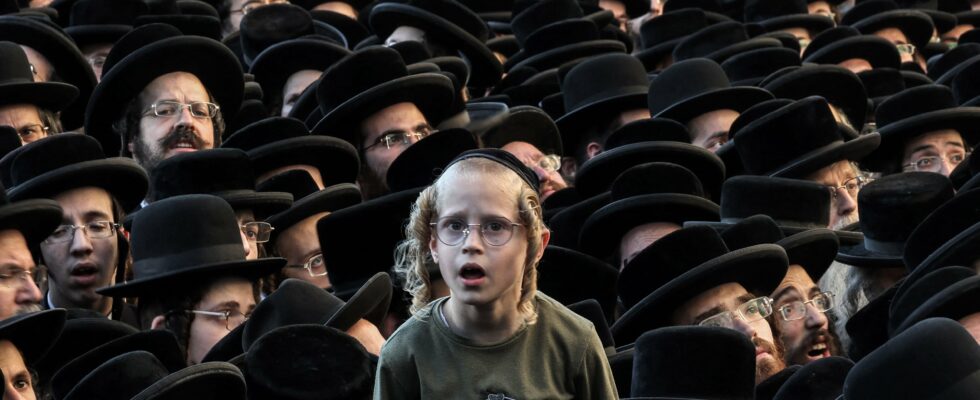With his beard and long sideburns, Avrumi Linsche poses every day in Tsahal uniform on social networks. A way of encouraging his peers to follow his example, to break the great taboo of the Orthodox world: to serve in the Israeli army. “As an integral part of the Jewish people, we must play our part in the war. I know that some fear that the secularists will suffocate us with the help of the Supreme Court, that they will try to change us. But, in my opinion, we must ignore these empty controversies and do our duty,” wrote this week this robust thirty-year-old, endowed with great eloquence and familiar with television sets. Avrumi Linsche embodies the exception, an Orthodox in Tsahal, and his message comes up against the resolute hostility of the rabbis.
As the Israeli Supreme Court has just demanded for the first time the enlistment of at least 3,000 Orthodox, demonstrations by young people from this religious community are multiplying across the country. “Rather die than enlist,” chant the protesters. Blocking roads and sometimes violently confronting the police, young Orthodox openly defy the Israeli government and threaten the balance of the coalition.
Limit contacts with the secular world to the strict minimum
Avrumi Linsche experienced first-hand this radical rejection of conscription among the Orthodox. Coming from a large family that was a member of the Gour Hasidic community, one of the major groups of the Men in Black, he chose to enlist shortly after he turned 18. This was a sacrilegious step in an environment where a tradition dating back to the ghettos of Eastern Europe requires young men to devote their lives to the study of Torah and to limit contact with the secular world to a strict minimum.
Today, as in the past, the rebels exclude themselves from the community. “My parents asked me to leave home because they didn’t want me to be a bad influence on my brothers,” says Avrumi Linsche. “Just like if I had sold drugs. They thought I was leading them down the wrong path.”
Thrown out of the family home, he found asylum in a home for young Orthodox men serving in the IDF. “Reluctance towards the army remains very strong. The Orthodox world has never recognized the legitimacy of the State of Israel and, for it, the army corrupts its children. [Ses membres] do not hesitate to break up with them, both to avoid contagion and to protect their reputation,” explains Aharon Granot, director of the Osey Chail association, which manages shelters for young Orthodox Christians.
An exceptional regime since the creation of the State of Israel
Revered by the vast majority of other Israeli Jews, the IDF remains an object of distrust for the Orthodox, who are automatically exempt from military service. The arrangement dates back to the origins of the State of Israel. To win the favor of the Orthodox rabbis – anti-Zionist on principle, because they are convinced that the arrival of the Messiah must precede the restoration of Jewish sovereignty over the land of Israel – David Ben-Gurion, founder of the Hebrew state, gave in to their demands.
A status quo was established: the rabbis would mute their anti-Zionism and the state would grant them subsidies and exempt them from military service. “In Ben-Gurion’s time, yeshiva students [NDLR : les académies talmudiques] were only a few hundred. Today there are 70,000. The stakes are completely different, especially in times of war. Since October 7, society has become increasingly fed up with the refusal of Orthodox people to serve in the army,” explains Daniel Haïk, former editor-in-chief of the French edition of the Orthodox newspaper Hamodia, Today he is an analyst for the international channel I24 News.
Last April, this exasperation reached new heights when the Sephardic Chief Rabbi Yitzhak Yosef declared: “If we are forced to join the army, we will all go abroad. We will buy a one-way ticket and go there.” “Scandalous remarks, contrary to the spirit and the letter of the Torah,” gasped Rabbi Eliahou Zini, representative of the religious Zionist movement, in favor of conscription. As for the secularists, they are indignant that the Orthodox, generously showered with public subsidies, refuse to “share the burden.”
A danger to the survival of the Netanyahu government
“I hear this anger,” concedes Rivka Ravitz, an Orthodox Jewish mother of 12 who served as chief of staff to Reuven Rivlin, president from 2014 to 2021. “When I talk to my secular friends whose children are on the front lines, I inevitably feel embarrassed. But we have to understand each other. For us, the army is a machine for secularizing our children. We don’t want to melt them into the Israeli melting pot. We are capable of serving in other ways, such as in charities or the emergency services.”
To encourage the conscription of Orthodox men, the IDF has tried to adapt by creating units without women, strictly respecting Jewish dietary laws and prayer times. But they only attract a handful of individuals. “As long as the rabbis do not give the green light to enlistment in the IDF, nothing will change. Because they are the ones who decide everything in the Orthodox world,” says journalist Daniel Haik.
Faced with the almost unanimous rejection of the Supreme Court decision by the Orthodox, the secular camp does not intend to give in. The parliamentary opposition is demanding coercive measures and the elimination of subsidies to yeshivas. A significant part of Benjamin Netanyahu’s Likud is following suit. Yuli Edelstein, one of the Prime Minister’s main lieutenants, expressed his determination to him during a stormy conversation. Faced with the threat of forced enlistment, the Orthodox parties, indispensable allies of Netanyahu, are threatening to leave the coalition. In the midst of a war, the fall of the government would have incalculable consequences.
.
